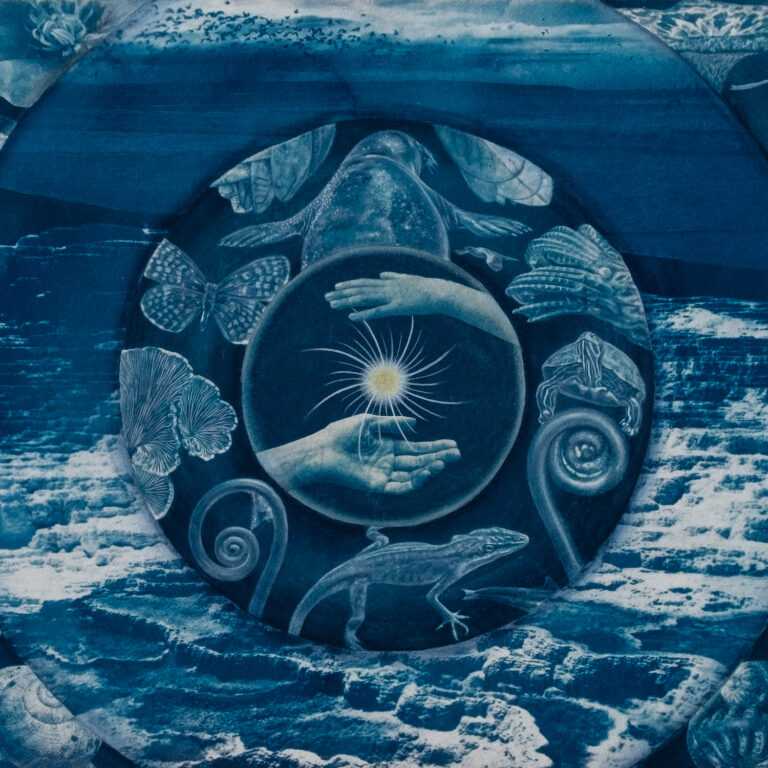Find all the episodes featured in this starting point — and save them to listen later.

Our role as human people is not just to take from the earth, and the role of the earth is not just to provide for our single species. Reciprocity actually broadens this notion to say that not only does the earth sustain us, but that we have the capacity and the responsibility to sustain her in return.
The wonderful civil rights elder Vincent Harding liked to look around the world for what he called “live human signposts” — human beings who embody ways of seeing and becoming and who point the way forward to the world we want to inhabit. And adrienne maree brown, who has inspired worlds of social creativity with her notions of “pleasure activism” and “emergent strategy,” is surely one of these.
We’re listening with new ears as she brings together so many of the threads that have recurred in this season of On Being: on looking the harsh complexity of this world full in the face while dancing with joy as life force and fuel and on keeping clear eyes on the reasons for ecological despair while giving oneself over to a loving apprenticeship with the natural world as teacher and guide. A love of visionary science fiction also finds a robust place in her work and this conversation. She altogether shines a light on an emerging ecosystem in our world over and against the drumbeat of what is fractured and breaking — the cultivation of old and new ways of seeing, towards a transformative wholeness of living.
Video
Excerpts from On Being episodes with J. Drew Lanham, Robin Wall Kimmerer, Katy Payne, and Robert Macfarlane.
Oceanographer Sylvia Earle was the first person to walk solo on the bottom of the sea, under a quarter mile of water. She has watched humanity’s enduring fascination with “outer space” while she has delighted in “inner space” — the alien and increasingly endangered worlds beneath earth’s waters. These frontiers, as Sylvia Earle points out, are our very life-support system. She takes us inside the knowledge she’s gathered from a lifetime of research and literally swimming with sharks.
What’s the line between the blame that stops you from action and the acknowledgement that catapults you to do the right thing. You’ve got to practice that. You’ve got to practice that one every day.
Extras
January 19, 2023
Step away from the noise of the day and into this sonic pilgrimage through the natural world.
This meditation is featured in “A Wild Love for the World,” a collection designed to accompany the exploration of our relationship with the natural world.
We have to recognize the joy that the world didn't give us and that the world can't take away, in the midst of the world taking away what it can.
A Buddhist philosopher of ecology, Joanna Macy says we are at a pivotal moment in history with the possibility to unravel or create a life-sustaining human society. Now entering her 90s, Macy has lived adventurously by any definition. She worked with the CIA in Cold War Europe and the Peace Corps in post-colonial India and was an early environmental activist. She brings a poetic and spiritual sensibility to her work that’s reflected in her translations of the early-20th-century poet Rainer Maria Rilke. We take that poetry as a lens on her wisdom on the great dramas of our time: ecological, political, personal.
Katharine Hayhoe is one of the most esteemed atmospheric scientists in the world. She’s made her mark by connecting dots between climate systems and weather patterns and the lived experience of human beings in their neighborhoods and communities. She’s also an ambassador, if you will, between the science of climate change and the world of evangelical Christian faith and practice, which she also inhabits. To delve into that with her is to learn a great deal that refreshingly complicates the picture of what is possible and what is already happening, even across what feel like cultural fault lines. If you want to speak and walk differently on this frontier, this is a conversation for you.
Amidst all of the perspectives and arguments around our ecological future, this much is true: we are not in the natural world — we are part of it. The next-generation marine biologist Ayana Elizabeth Johnson would let that reality of belonging show us the way forward. She loves the ocean. She loves human beings. And she’s animated by questions emerging from those loves — and from the science she does — which we scarcely know how to take seriously amidst so much demoralizing bad ecological news. This hour, Krista draws out her creative and pragmatic inquiry: Could we let ourselves be led by what we already know how to do, and by what we have it in us to save? What, she asks, if we get this right?
Search results for “”
Filters
/